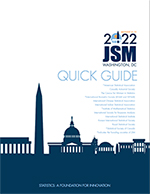Back
2022 Joint Statistical Meetings
Quality and Productivity Section
Session: Improving Quality
Assessment of Mobility Impacts of Adaptive Traffic Control System (ATCS) Using Flexible Regression Models
Wednesday, August 10, 2022
Activity Number: 391
-
John Kodi
Florida International University
The adaptive traffic control system (ATCS) is a Transportation Systems Management and Operations (TSM&O) strategy that automatically and dynamically adjusts the signal timing parameters to optimize corridor performance based on real-time traffic demand. This study introduces a flexible Bayesian analytical approach for fitting the travel time pattern and ultimately ascertaining the mobility impacts of ATCS based on buffer index (BI) and coefficient of variation (CV) of travel time as the performance measures. This research used Bayesian inference, which overcomes the limitations of traditional methods of assessing the null hypothesis that may result in overestimating the effect and lead to inappropriate interpretations. The analysis was based on a 3.3-mile corridor with ten signalized intersections equipped with SynchroGreen ATCS in Jacksonville, Florida. Overall, the model estimates indicated that ATCS was associated with a lower BI and CV of travel time, thus improving travel time reliability along the corridor. Transportation agencies and other stakeholders could use the finding from this study to justify the deployment and expansion of ATCS at signalized intersections.

